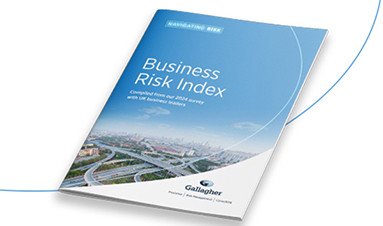An analysis of the most pressing concerns based on insights from 1,000 UK business leaders.

For small businesses, it’s more important than ever to protect themselves against the potential ‘domino effect’ of late payments and customer insolvency.
Government support schemes helped to suppress UK insolvencies and keep rates low in 2020-2021, but the coming year will likely paint a different picture now that this help has been withdrawn.
In September 2021, as the Job Retention Scheme wound down, there were 1,400 insolvencies recorded in England and Wales alone1 — the highest level since March 2020. A recent Bank of England report found that one-third of UK’s small businesses were classified as highly indebted, with debt levels of more than ten times their cash balances, more than double the amount of small business (14%) in this situation before the pandemic.2
Some businesses will continue to weather the storm in the face of continued uncertainty, but for others, the combined challenges of the ongoing pandemic, Brexit, the national living wage increase, higher energy prices and consumer caution will be difficult to overcome. A recent report by trade credit insurer, Atradius, suggests that insolvencies will surge in 2022, and may be 33% higher than before the pandemic began.3
The risks and consequences of late payment
According to the Federation of Small Businesses (FSB), a late payment crisis is looming. In a survey, 30% of small businesses told the FSB they had seen the late payment of invoices increase in the three-month period preceding the survey (Q4 2021), with at least 8% saying that the issue was threatening the viability of their business.4
This is not a new problem for small businesses, but the pandemic has heightened the risk of payment default, and the potential consequences for those on the ‘non-receiving end’.
Of course, some customers rely on the option of payment on credit terms as they will not always be in a position to pay for goods or services upfront. But for the business supplying them in this way, it’s impossible to be sure of their creditworthiness, particularly if a trading relationship has not already been established. If a customer were to become insolvent while owing you money, it could have a devastating impact on your business—potentially even leaving your business facing insolvency too.
This is where a trade credit insurance product can step in to provide financial protection, and help keep your business moving.
The benefits of credit insurance
Aside from the obvious benefit of reassurance that you won’t be out of pocket due to a customer payment default, credit insurance brings additional plus points. It can empower you to enter new markets, expand domestically or internationally, or simply offer higher credit limits to your customers. It can also encourage new customers to buy from you as they may be more likely to choose a business that offers this payment option.
Your own suppliers, too, may have greater confidence in your business if they know that you have credit insurance in place, because it is less likely for you to default on a payment to them as a result of cash flow problems caused by the knock-on effect of non-payment to you.
Single invoice insurance
While traditional credit insurance typically requires you to insure your entire turnover, single invoice insurance can be a viable alternative—particularly for small businesses. Perhaps you may want to insure an invoice sent to a new and unfamiliar client, or you may simply want extra reassurance that certain invoices are covered, whether that’s a decision based on the client or the invoice amount.
Single invoice insurance lets you choose the invoice or invoices you want to protect, and get an instant insurance policy to cover payment default on those invoices. This can be done in minutes online, and each time a quote is provided it will be based on the customer’s risk profile as well as the amount owed.
How Gallagher can help
Gallagher’s Trade Credit team can help you determine an appropriate credit insurance solution for your business. You may wish to protect your whole turnover, key accounts, or have the flexibility to pick and choose which invoices you want to insure—we can provide single invoice insurance for invoices up to £500,000 through one of our specialist trade credit insurance partners.
If you would like to speak to a member of the team about protecting your business with trade credit insurance, please get in touch.
- https://www.theguardian.com/business/2021/oct/15/more-than-1400-firms-went-bust-last-month-in-england-and-wales-figures-show
- https://www.theguardian.com/business/2021/oct/15/more-than-1400-firms-went-bust-last-month-in-england-and-wales-figures-show
- https://www.insurancebusinessmag.com/uk/news/sme/uk-business-failures-projected-to-surge-in-2022--report-312635.aspx
- https://amp-theguardian-com.cdn.ampproject.org/c/s/amp.theguardian.com/business/2022/jan/03/uks-late-payment-crisis-risks-future-of-440000-small-firms
This note is not intended to give legal or financial advice, and, accordingly, it should not be relied upon for such. It should not be regarded as a comprehensive statement of the law and/or market practice in this area. In preparing this note we have relied on information sourced from third parties and we make no claims as to the completeness or accuracy of the information contained herein. It reflects our understanding as at 19/01/2022, but you will recognise that matters concerning COVID-19 are fast changing across the world. You should not act upon information in this bulletin nor determine not to act, without first seeking specific legal and/or specialist advice. Our advice to our clients is as an insurance broker and is provided subject to specific terms and conditions, the terms of which take precedence over any representations in this document. No third party to whom this is passed can rely on it. We and our officers, employees or agents shall not be responsible for any loss whatsoever arising from the recipient’s reliance upon any information we provide herein and exclude liability for the content to fullest extent permitted by law. Should you require advice about your specific insurance arrangements or specific claim circumstances, please get in touch with your usual contact at Gallagher.




